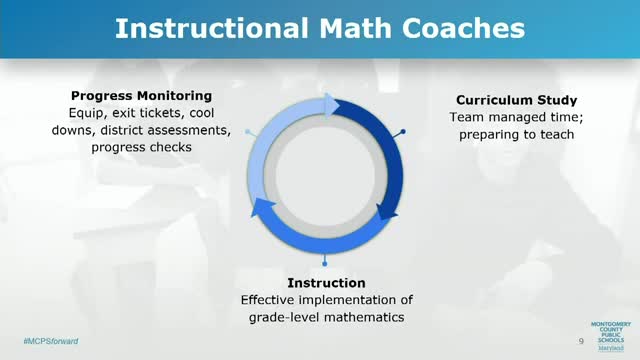Math performance flat districtwide; instructional coaches credited with localized gains
January 10, 2025 | Montgomery County Public Schools, School Boards, Maryland
This article was created by AI summarizing key points discussed. AI makes mistakes, so for full details and context, please refer to the video of the full meeting. Please report any errors so we can fix them. Report an error »

Montgomery County Public Schools officials told the board on Jan. 9 that fall 2024 MAP mathematics data showed little overall movement districtwide and that kindergarten entrants scored lower on average than in prior years. At the same time, district leaders highlighted promising, localized gains in schools that had sustained, job‑embedded math coaching.
Carla Britt, a district math supervisor, and several instructional coaches described a model in which centrally assigned math coaches work side‑by‑side with grade‑level teams to improve planning, classroom routines, and immediate feedback loops between formative exit tickets and the next day’s instruction. Kylene Toomey, an elementary instructional math coach who described a multi‑year partnership with Strawberry Knoll Elementary, said that by looping with the same student cohort from first into second grade and maintaining grade‑level planning and implementation coaching “we are finding the student cohort experience allows us to continue to raise the bar for planning and instruction while also allowing us to track student progress over time.”
At the middle‑school level, a coach reported measured growth percentiles for Black or African American students at Dr. Martin Luther King Jr. Middle School that were substantially above the normative 50th percentile; the coach credited regular protected planning time, curriculum study that included language routines, and principal support for keeping planning time protected from coverage.
District leaders stressed the importance of content knowledge for elementary teachers, protected collaborative planning time, and job‑embedded coaching rather than one‑off workshops. They also flagged statewide changes: the Maryland State Department of Education plans to move from separate algebra/geometry sequences toward an integrated math sequence in coming years, which will require new implementation and professional learning.
Why it matters: Math gaps across grades and racial/ethnic groups are a persistent concern. MCPS officials argued that the combination of curriculum study, practice‑focused coaching and better alignment of planning to instruction produces measurable improvements at schools where the model is implemented consistently. Board members asked for clearer data disaggregation (including magnet vs. neighborhood students) and for plans to scale coaching where it is most needed.
What’s next: District staff said they will refresh the facilities‑linked capacity planning that underpins scheduling and will continue to expand coaching and specialist support in budget proposals; they will also provide further school‑level data (including sample sizes) and cluster‑based deployment plans for instructional math coaches.
Limitations: MAP tests change format and coverage at several grade breakpoints; district staff noted comparisons must account for test differences and cohort sequencing. The district’s math‑coach coverage is still limited (dozens of coaches assigned across hundreds of schools), and officials said scaling requires budgeted staff and cross‑functional deployment.
Carla Britt, a district math supervisor, and several instructional coaches described a model in which centrally assigned math coaches work side‑by‑side with grade‑level teams to improve planning, classroom routines, and immediate feedback loops between formative exit tickets and the next day’s instruction. Kylene Toomey, an elementary instructional math coach who described a multi‑year partnership with Strawberry Knoll Elementary, said that by looping with the same student cohort from first into second grade and maintaining grade‑level planning and implementation coaching “we are finding the student cohort experience allows us to continue to raise the bar for planning and instruction while also allowing us to track student progress over time.”
At the middle‑school level, a coach reported measured growth percentiles for Black or African American students at Dr. Martin Luther King Jr. Middle School that were substantially above the normative 50th percentile; the coach credited regular protected planning time, curriculum study that included language routines, and principal support for keeping planning time protected from coverage.
District leaders stressed the importance of content knowledge for elementary teachers, protected collaborative planning time, and job‑embedded coaching rather than one‑off workshops. They also flagged statewide changes: the Maryland State Department of Education plans to move from separate algebra/geometry sequences toward an integrated math sequence in coming years, which will require new implementation and professional learning.
Why it matters: Math gaps across grades and racial/ethnic groups are a persistent concern. MCPS officials argued that the combination of curriculum study, practice‑focused coaching and better alignment of planning to instruction produces measurable improvements at schools where the model is implemented consistently. Board members asked for clearer data disaggregation (including magnet vs. neighborhood students) and for plans to scale coaching where it is most needed.
What’s next: District staff said they will refresh the facilities‑linked capacity planning that underpins scheduling and will continue to expand coaching and specialist support in budget proposals; they will also provide further school‑level data (including sample sizes) and cluster‑based deployment plans for instructional math coaches.
Limitations: MAP tests change format and coverage at several grade breakpoints; district staff noted comparisons must account for test differences and cohort sequencing. The district’s math‑coach coverage is still limited (dozens of coaches assigned across hundreds of schools), and officials said scaling requires budgeted staff and cross‑functional deployment.
View full meeting
This article is based on a recent meeting—watch the full video and explore the complete transcript for deeper insights into the discussion.
View full meeting
